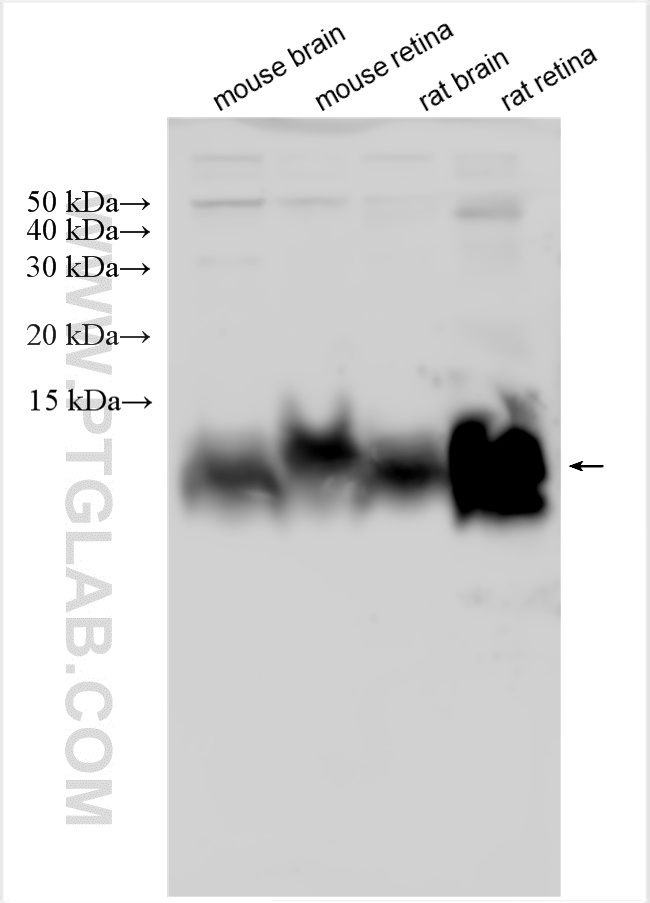验证数据展示
经过测试的应用
| Positive WB detected in | mouse brain tissue, mouse retina tissue, rat brain tissue, rat retina tissue |
推荐稀释比
| 应用 | 推荐稀释比 |
|---|---|
| Western Blot (WB) | WB : 1:500-1:3000 |
| It is recommended that this reagent should be titrated in each testing system to obtain optimal results. | |
| Sample-dependent, Check data in validation data gallery. | |
产品信息
18223-1-AP targets GNG13 in WB, ELISA applications and shows reactivity with human, mouse, rat samples.
| 经测试应用 | WB, ELISA Application Description |
| 经测试反应性 | human, mouse, rat |
| 免疫原 | GNG13 fusion protein Ag13007 种属同源性预测 |
| 宿主/亚型 | Rabbit / IgG |
| 抗体类别 | Polyclonal |
| 产品类型 | Antibody |
| 全称 | guanine nucleotide binding protein (G protein), gamma 13 |
| 别名 | h2 35, Guanine nucleotide-binding protein G(I)/G(S)/G(O) subunit gamma-13, G(gamma)13 |
| 计算分子量 | 67 aa, 8 kDa |
| 观测分子量 | 8 kDa |
| GenBank蛋白编号 | BC093760 |
| 基因名称 | GNG13 |
| Gene ID (NCBI) | 51764 |
| 偶联类型 | Unconjugated |
| 形式 | Liquid |
| 纯化方式 | Antigen affinity purification |
| UNIPROT ID | Q9P2W3 |
| 储存缓冲液 | PBS with 0.02% sodium azide and 50% glycerol , pH 7.3 |
| 储存条件 | Store at -20°C. Stable for one year after shipment. Aliquoting is unnecessary for -20oC storage. |
背景介绍
GNG13 (Guanine nucleotide-binding protein G (G gamma 13)) is a gene that encodes a gamma subunit of a heterotrimeric G protein. It is expressed in taste, retinal, and neuronal tissues and is crucial for taste transduction. In the main olfactory epithelium (MOE), most olfactory sensory neurons (OSNs) express G proteins consisting of Gαolf and Gβ1γ13. Conditional knockout of the Gng13 gene in mice significantly altered the MOE's gene expression profile and impaired the mutant animals' food - seeking capabilities (PMID: 30157062).
实验方案
| Product Specific Protocols | |
|---|---|
| WB protocol for GNG13 antibody 18223-1-AP | Download protocol |
| Standard Protocols | |
|---|---|
| Click here to view our Standard Protocols |
